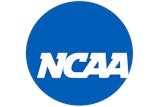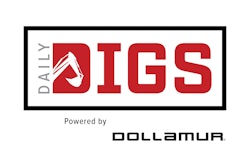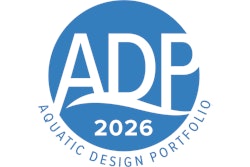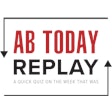The writing was on the wall beginning last summer, when for the first time in the six-year history of the NCAA-sponsored Scholarly Colloquium on Intercollegiate Athletics, the NCAA News failed to promote a call for papers. ...
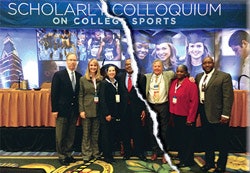 LAME DUCK SESSIONS The fate of the Scholarly Colloquium on Intercollegiate Athletics already sealed, Ellen Staurowsky (third from left) and Dave Wiggins (third from right) guided the 2013 programming in Dallas.
LAME DUCK SESSIONS The fate of the Scholarly Colloquium on Intercollegiate Athletics already sealed, Ellen Staurowsky (third from left) and Dave Wiggins (third from right) guided the 2013 programming in Dallas.The writing was on the wall beginning last summer, when for the first time in the six-year history of the NCAA-sponsored Scholarly Colloquium on Intercollegiate Athletics, the NCAA News failed to promote a call for papers. Come fall, there were conversations between a top NCAA official and the colloquium president regarding the perceived ideological bent of researchers in recent years and how that put the association's funding of the annual event "at risk." By December, the colloquium's program chair was interviewed for an NCAA News article previewing the 2013 colloquium, but the article was never published. Finally, on Jan. 14, the very eve of the two-day event preceding the 2013 NCAA Convention in Dallas, NCAA chief operating officer Jim Isch informed members of a 17-member advisory and editorial board that this year's colloquium, under the theme "Economic Inequality Within the NCAA," would be the last.
"There are all kinds of theories circulating as to why this happened, but I really truly do not know," says Drexel University sport management professor Ellen Staurowsky, the 2013 program chair. "And when you look at the warning - that the colloquium is too ideological, that the research is questionable - and then you look at the program, the list of people and the work that they're doing, there's just a disconnect between the language that was used and the program content. We had scholars looking at all kinds of things - the pay rates of coaches of women's programs compared to men's programs, compensation packages for big-time coaches, whether or not the investment that campuses make in stadiums is worth it. When you're doing research, you're asking critical questions for the purpose of problem solving. It's about being able to unearth findings that are going to be helpful in the decision-making process."
The stated goals of the colloquium, the brainchild of past NCAA president Myles Brand, were to attract academics to the NCAA as a research topic and to produce research of sufficient quality to impact NCAA policy. "He probably had a third motive, too - to better demonstrate that college athletics is a different breed of animal than professional sport," says Penn State University professor of exercise and sport science Scott Kretchmar, who Brand recruited to preside over the inaugural colloquium in 2008 after a 2007 event organized by NCAA staffers was scuttled. "But Myles was an academic himself. He personally loved research."
"At the end of the day, I'm an academic, and nobody in this room values research more than me," current NCAA president Mark Emmert stated at a convention news conference in January, as reported by The Chronicle of Higher Education. "There are lots of subjects around which we need good, thoughtful objective research. We just need to deploy research in the most effective way to get the best return on investment we can."
The amount of that investment is unclear. Colloquium board members say Isch told them in January that $1.2 million total had been spent on both the meeting (board members and keynote presenters were flown and fed at the NCAA's expense) and its corresponding Journal of Intercollegiate Sport, published twice annually by Human Kinetics. However, a year earlier the NCAA-supplied figure was a mere $80,000 annually, according to Staurowsky. "In the grand scheme of things, the amount of funding would not even rise to half a percent of the overall NCAA budget," she says.
Wally Renfro, the NCAA senior advisor who issued the "at risk" warning to current colloquium president Dave Wiggins last fall, declined AB's interview request, but Isch offered the following statement via email:
"The NCAA helped create the Scholarly Colloquium as a pilot program in 2008. The goal was to develop an environment that would foster new ideas and new scholarship to help inform future policy related to higher education and college athletics. Unfortunately, the colloquium has not met this goal. After six years, the scholarship has not developed in the way we hoped; the journal established in conjunction with the colloquium has narrow distribution; and overall participation at the colloquium has been limited. In particular, of the 88 scholarly articles published in the journal, 48 have been cited in other works, mostly in theses (the majority, 36, have three or less citations). Of the 1,200 copies of the Journal of Intercollegiate Sport that are printed, the NCAA buys 90 percent of them and distributes them free to faculty athletics representatives. For this colloquium, only 50 people registered, and many of them were presenters or board members. The NCAA is not ending its support for research; instead, it will redirect its resources from the colloquium to other research."
Wiggins, assistant dean of George Mason University's School of Recreation, Health and Tourism, says he doesn't recall ever hearing the colloquium referred to as a pilot program, nor does he recall Renfro ever mentioning resources. Even if the NCAA's grievances were based solely on colloquium subject matter, Wiggins points out that it was common for both Renfro and Isch to attend the annual board meeting, where future colloquium themes were discussed, and that at least two members of the NCAA's own research staff were included in monthly conference calls during the event's planning process (two served as presenters at the 2012 "Academic Reforms" colloquium).
"We brought in some folks who have been highly critical of sport, intercollegiate athletics and the NCAA," Wiggins admits, with a nod to economist Andrew Zimbalist, a 2013 keynoter. "But last year we had a panel discussion of athletic directors; this year, we had a panel discussion of presidents and chancellors - folks who deal with intercollegiate athletics on a daily basis. I think the scholarship and research that was presented was balanced, generally, and that the results are important. You would hope one day that maybe the results generated from the research would influence policy, but it's probably a situation where the only policies the NCAA is interested in are the ones it creates itself."
Staurowsky contends that Isch's registration figure is misleading, since anyone registered for the NCAA Convention was welcome at the colloquium. Actual attendance at several of this year's sessions was significantly higher than 50, with at least one topping 100, she says, adding that an unprecedented 70 scholars contributed to the 2013 program. "For a young conference, it was building momentum," she says.
Moreover, the notion that the Journal of Intercollegiate Sport is unworthy of continuing is directly refuted by its publisher. "We believe that the Journal enjoys a lofty reputation among scholars," says Greg Reed, journals division director at Human Kinetics. "It's important research that we think needs to go out to the intercollegiate community, and therefore we intend to pursue publication" beyond 2013 (the final year of the NCAA's financial support).
The absence of an NCAA colloquium won't necessarily equate to a dearth of research into intercollegiate athletics. The College Sport Research Institute will host its sixth annual Conference on College Sport this month in Chapel Hill, N.C., making it "the only conference left that's focused on college sport research specifically," says founder and director Richard Southall. CSRI will soon relocate from UNC to the University of South Carolina, where it will benefit from two research assistants and the research of Ph.D. students in USC's Department of Sport and Entertainment Management. "We're also going to be reaching out to the members of the NCAA colloquium board to see about working with them to continue to encourage research on college sport," says Southall, a three-time colloquium presenter. "Those are all things that we're doing to try to step into this void."
The Drake Group, a faculty-based organization focused on academic integrity in college athletics, will continue to stage its annual meeting in conjunction with CSRI (though the two are not affiliated), according to Ohio University sports administration professor Dave Ridpath, who never attended the colloquium, feeling the NCAA's foray into research lost credibility after the 2007 cancellation. "I always felt that something like this was inevitable," says Ridpath, the Drake Group president from 2004 to 2007, calling the "excuses" of NCAA officials for the latest cancellation "pathetic" and "disingenuous." "I believe that they felt threatened by the Drake Group, CSRI and others and thus tried to control the research narrative through their own journal and conference. When they found out they could not, they took their ball and ran home."
It's a decision that should carry consequences, according to Staurowsky. "An association whose tax-exempt status hinges on its assertion that it supports the mission of higher education has sought to discourage dissent," she says. "That's the key issue that has to be understood here." When asked if she would characterize colloquium research as dissent, Staurowsky adds, "I would not characterize it as dissent. I would characterize it as critical examination of key issues. However, it's clear from the message that was communicated by Wally Renfro that, in their eyes, this was dissent that needed to be shut down."
Does the NCAA have an obligation to financially support research that often shines an unflattering light on its enterprise? Renfro and Isch did not directly address this question, but Staurowsky - a former college athlete, coach and athletic director - has an answer. "The ability of scholars and their students to engage in open, independent, critical dialog is something that is a pillar of the American higher education system. It's the contribution that we make to the American democracy. Professors are obligated literally to seek the truth wherever it leads - whether it's complimentary or critical," she says. "Cutting off funding because there was a perception that the NCAA did not like what some scholars had to say is a direct violation of academic freedom, especially in light of this financial relationship. For an organization that represents higher education to have done this, that's as bad of a violation as you can get."














